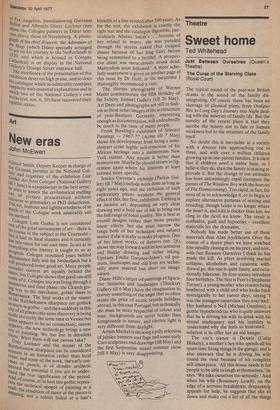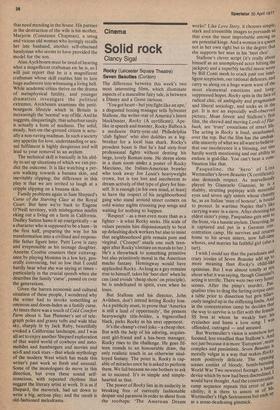Sweet home
Ted Whitehead
Just Between Ourselves (Queen's Theatre) The Curse of the Starving Class (Royal Court) The typical sound of the post-war British drama is the sound of the family dis
integrating. Of course there has been no shortage of classical plays, from Oedipus Rex to Long Day's Journey into Night dealing with the miseries of family life. But the novelty of the recent plays is that they ascribe the misery not to fate or human weakness but to the structure of the family
itself.
No •doubt this is inevitable in a society with a divorce rate approaching one in three, and with over a million children growing up in one-parent families. It is clear that if children need a stable base, as I believe they do, then the family is ceasing to provide it. But the change in our attitudes has been astonishingly rapid (compare the pieties of The Winslow Boy with the horrors of The Homecoming). Too rapid, in fact, for most of us to acknowledge it, or to begin to explore alternative patterns of mating and breeding; though home is no longer where the heart is, and kith is thicker than kin, we cling to the devil we know. The result is confusion, guilt and hypocrisy – excellent materials for the dramatist.
Nobody has made better use of these materials than Alan Ayckbourn. Over the course of a dozen plays we have watched him steadily closing in on his prey, and now, with Just Between Ourselves I think he has made the kill. As plays involving marital collapse, alcoholism and catatonic withdrawal go, this one is quite funny, and occasionally hilarious. Its four scenes introduce four birthdays. The first is Pam's (Stephanie Turner), a young mother who resents being lumbered with a child and who looks back nostalgically to her career days, saying 'I was the youngest supervisor they ever had.' Her husband is Neil (Michael Gambon), a gentle hypochondriac who is quite unaware that he is driving his wife to drink with his sexual inadequacy and his inability to understand why she feels so frustrated. solution is to offer her an old banger.
The car's owner is Dennis (Colin Blakely), a mother's boy who spends all his spare time fixing things in the garage, and is also unaware that he is driving his wife round the twist because of his complete self-absorption. 'All this house needs is for people to be able to laugh at themselves,' he says. 'We take ourselves too seriously.' And when his wife (Rosemary Leach), on the edge of a nervous breakdown, desperately appeals for help, he suggests that she sit down and make out a list of all the things that need mending in the house. His partner in the destruction of the wife is his mother, Marjorie (Constance Chapman), a smug and vicious old woman who lovingly recalls her late husband, another self-obsessed handyman who seems to have provided the model for the son.
Alan Ayckbourn must be tired of hearing what a magnificent craftsman etc he is, so I will just report that he is a magnificent craftsman whose skill enables him to lure huge audiences into witnessing a living hell.
While academic critics thrive on the drama of metaphysical futility, and younger dramatists investigate the political extremes, Ayckboum examines the petitbourgeois lifestyle which in Britain is increasingly the 'normal' way of life. And he suggests, disquietingly, that suburban sanity is actually a form of madness. The solid, steady, feet-on-the-ground citizen is actually a non-raving madman. In such a society any appetite for love, understanding or sexual fulfilment is highly dangerous and will lead to your removal to an asylum.
The technical skill is basically in his ability to set up situations of which we can predict the outcome. It is like watching a person walking towards a banana skin, and inevitably slipping; the difference in this play is that we are invited to laugh at a cripple slipping on a banana skin.
Family problems again in Sam Shepard's Curse of the Starving Class at the Royal Court. But here we're back to Eugene O'Neill territory, with misbegotten misfits eking out a living on a farm in California. Dudley Sutton hams it up energetically – as a character who is supposed to be a ham – in the first half, preparing the way for his transformation into a civilised and responsible father figure later. Patti Love is zany and irrepressible as his teenage daughter. Annette Crosbie counters their extravagance by playing Momma in a low key, generally .convincing, but so low that I could hardly hear what she was saying at times – particularly in the crucial speech when she describes the family 'curse', passed on over the generations.
Given the barren economic and cultural situation of these people, I wondered why the writer had to invoke something as ominous and doom-laden as a family curse. At times there was a touch of Cold Comfort Farm about it. Sue Plummer's set of telegraph poles and grassy tufts and wide blue sky, sharply lit by Jack Raby, beautifully evoked a Californian landscape, and I was all set to enjoy another Shepard exploration of that weird world of cowboys and automobiles and hamburgers and movies and sci-fi and rock stars – that whole mythology of the modern West which has made this writer's past work so fresh and unusual. Some of the monologues do move in this direction, but even these sound selfconscious, with repeated rhythms that suggest the literary artist at work. It is as if Shepard, the maverick, had sat down to write a big, serious play; and the result is old-fashioned melodrama.



































 Previous page
Previous page